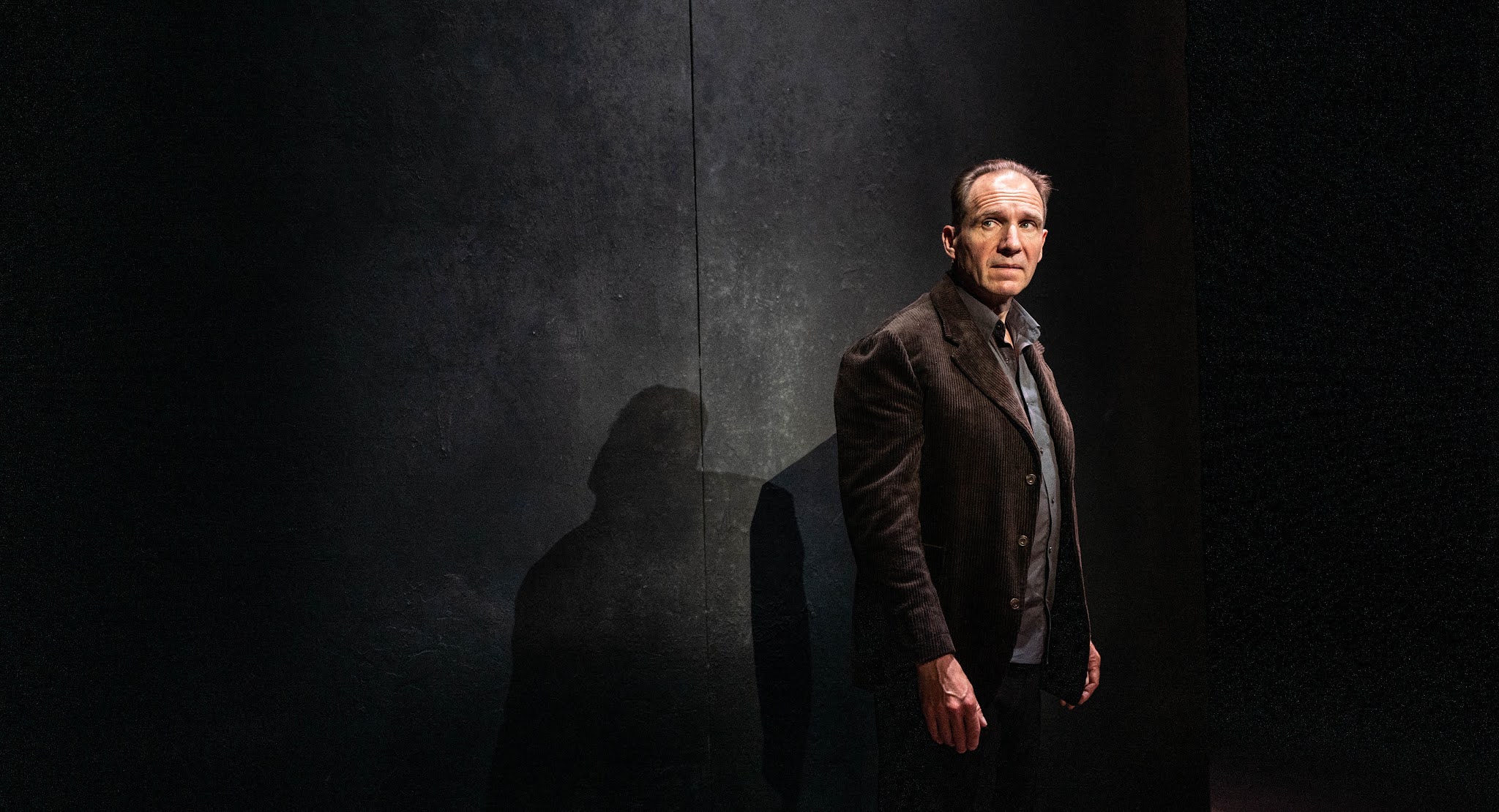
Ralph Fiennes is one of our best British actors remembered by a wide public for his betrayal of Voldemort in the Harry Potter Films and M in several Bond films. I shall forever remember him for his reading of Oscar Wilde’s De Profundis at Reading Gaol, a marathon effort that held us spellbound and enthralled for four hours in front of just the cell door of Wilde’s prison cell. His latest stage appearance is in TS Eliot’s poems Four Quartet which started life at the Theatre Royal in Bath and is heading for the Harold Pinter Theatre in London from the 18th November.
Fiennes directs himself in the powerful and physical recitation of the four poems as he prowls around the stage with two large grey monoliths and two old wooden chairs and a table as his only aids. Eliot’s poems were written between 1935 and 1941 and there is a helpful glossary in the programme of around twenty-five words used that may be less familiar to a modern audience and some interesting articles to provide some context for the work. However, I was left feeling intellectually inadequate as I struggled to make sense during the show of the frustrating contradictory paradoxes used throughout. In lesser hands, it would have become uninteresting, but Fiennes breathes life into the words and convinces that he understands the meaning. Every P and T is accentuated in his delivery in a masterclass of pronunciation and elocution so that not a word is lost. If the aim is to provoke thought, discussion, and reflection it works a treat, but I would have liked more visual aids to provide more immediate in show understanding.
 The four poems although written over a long period are interlinked with consistent themes and follow similar structures in their composition. Time is an overarching linkage, Time Past, Time Future and Time Present. Each poem takes inspiration from an actual location which is then used as a metaphor for a period of human life or a season of nature’s annual cycle or one of the natural elements. Burnt Norton (a house in Gloucestershire) is Youth, Spring, and Air; East Coker (a house in Somerset) is Courtship, Summer and Earth; Dry Salvages (a location in the US) is middle age, Autumn, and water and Little Gidding (a location in Cambridgeshire) is death, Winter, and fire. Into this is weaved religious elements and borrowed imagery from the mystical East, Calvinism, Kristina, Dante, and I am sure many others!
The four poems although written over a long period are interlinked with consistent themes and follow similar structures in their composition. Time is an overarching linkage, Time Past, Time Future and Time Present. Each poem takes inspiration from an actual location which is then used as a metaphor for a period of human life or a season of nature’s annual cycle or one of the natural elements. Burnt Norton (a house in Gloucestershire) is Youth, Spring, and Air; East Coker (a house in Somerset) is Courtship, Summer and Earth; Dry Salvages (a location in the US) is middle age, Autumn, and water and Little Gidding (a location in Cambridgeshire) is death, Winter, and fire. Into this is weaved religious elements and borrowed imagery from the mystical East, Calvinism, Kristina, Dante, and I am sure many others! The tone is sombre, and the words are delivered with gravitas, but Fiennes seeks to engage the audience as his eyes prowl over us especially when the house lights are raised (to me inexplicably) for short passages. The contradictory words are at times bemusing and opaque especially when the verse turns philosophical, and he reflects on “Time the destroyer” and “Time the preserver”. It is most accessible when it is in descriptive mode as in Burnt Norton when he paints a picture of the Gardens and poetically recalls “footfalls in the memory”. Or when the meaning resonated immediately as in East Coker when he says, “As we grow older, the world becomes stranger, the pattern more complicated, of dead and living”.
 The lighting design by the wonderful Tim Lutkin works hard to assist us in emphasizing the light and shade of the narrative and creating an effective representation of the fires of hell towards the end as well as poignant shadows cast on the monoliths, but some projected imagery or shapes may have illuminated the text more.
The lighting design by the wonderful Tim Lutkin works hard to assist us in emphasizing the light and shade of the narrative and creating an effective representation of the fires of hell towards the end as well as poignant shadows cast on the monoliths, but some projected imagery or shapes may have illuminated the text more. This is one of those theatrical events that any passionate lover of the arts should want to experience and Fiennes is a five-star performer as he showed us at Reading Gaol with a seductive and precise delivery but if you are going to book I recommend you read more in advance on TS Eliot’s work so you have an understanding of the structure and themes and you will get a greater appreciation of his art than I was able to get coming cold to the piece.
Four Quartets plays at the Harold Pinter Theatre from the 18th November to - 18th December.
Review by Nick Wayne
Rating: ★★★
Seat: Stalls, Row A | Price of Ticket: £50
